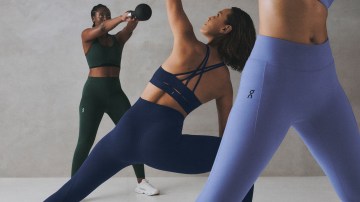You may soon see more of Vegamour on your LinkedIn feed — but not because the hair-care brand is going on a hiring spree. Instead, Vegamour is hoping to use the networking and job-driving social media platform to reach consumers.
On Thursday, Vegamour announced Innocos founder Iryna Kremin as its first “chief LinkedIn advisor.” Kremin will provide both strategic consulting for the brand’s LinkedIn presence and share sponsored content on her own LinkedIn profile, where she currently has more than 21,000 followers.
“LinkedIn has been a really exciting platform for thought leadership and for education. We knew there was already an audience there waiting for us,” said Michelle Miller, CMO of Vegamour, which is known for its hair growth products. “We were looking for a platform that had a lot of trust. In doing a lot of research, we saw that [LinkedIn] has a different kind of trust than Instagram or TikTok, but there are not a lot of brands paying for advertising on the platform.”
Miller said Vegamour sought out Kremin to join its LinkedIn strategy, based on her expertise in the longevity space. Kremin is the Belgium-based CEO and founder of Innocos, which hosts global events on topics like longevity, beauty and wellness.
“They approached me [saying] they were looking for somebody to help translate the science [of Vegamour’s products] into engaging, digestible LinkedIn content and to talk about longevity,” said Kremin. “And this is exactly my mission.”
Founded in 2016, Vegamour has used 2025 to beef up its marketing presence. The brand received $80 million in investment from General Atlantic in 2021 and announced Nicole Kidman as a celebrity investor for an undisclosed amount in 2022. It was projected to reach $160 million in sales in 2024. In March, Miller joined the brand as Vegamour’s first ever chief marketing officer. In July, Vegamour tapped the popular albeit controversial “tradwife” influencer Nara Smith as the face of its new hair supplement.
Vegamour is not the first consumer brand to see the opportunity to reach consumers on LinkedIn’s traditionally B2B platform, however. LVMH has used LinkedIn to livestream its brands’ runway shows since 2019. And in May, the hair-care brand K18 — which is also Miller’s former employer — teamed up with LinkedIn influencers Jade Walters and Elvi Caperoni on a consumer-facing campaign.
Those initiatives are in keeping with social strategy trends that see brands looking for new avenues to drive engagement and purchasing. While platforms like TikTok and Instagram remain dominant in driving mainstream trends and conversations, more fashion and beauty brands are experimenting with social platforms like LinkedIn, Reddit and Substack to find new audiences.
“What’s interesting about LinkedIn is it’s not necessarily new. It’s been around a long time — and there’s a shift in how people or creators are wanting to brand themselves on the platform or show up in new ways. That’s not happening on Instagram or TikTok,” said Miller. “Being able to see that, make that bet and test is something we’re passionate about. And it doesn’t mean we’re taking the gas off TikTok or Instagram by any means, but it’s definitely adding a new layer.”
Miller said LinkedIn will give Vegamour access to an older demographic than the largely youth-driven TikTok. According to Statista, users aged 25-34 represent the largest demographic on the platform, at just over 47% of LinkedIn’s user base. But that doesn’t mean its strategy will be wholly different from what brands utilize on TikTok: With the new partnership, Vegamour will push short-form videos on LinkedIn, as Miller said the platform is prioritizing short-form video content.
And while Vegamour’s LinkedIn strategy will offer more expertise and insight to consumers who want a peek behind the scenes, it will also encourage users to visit Vegamour’s website and, perhaps, buy its hair growth serums or supplements.
“We are testing some paid ads on the platform, which is certainly a CTA to shop or go to the site and learn more,” said Miller. “We’re really looking at it for top-of-funnel brand awareness, versus bottom-of-funnel performance metrics. What we’ll look at overall is how it affects both our brand metrics and our performance metrics. And when we see the brand doing well, the rest of our bottom-funnel ads do better, across TikTok, LinkedIn, wherever.”




